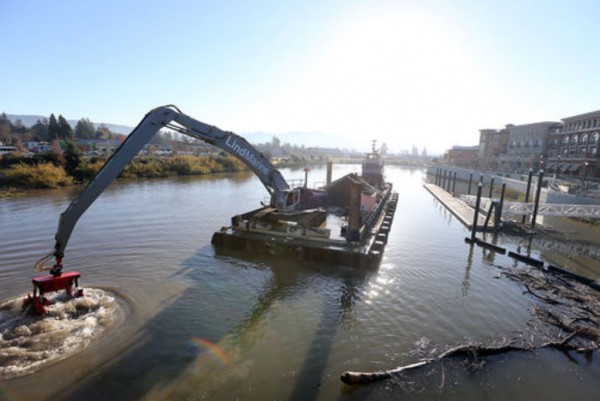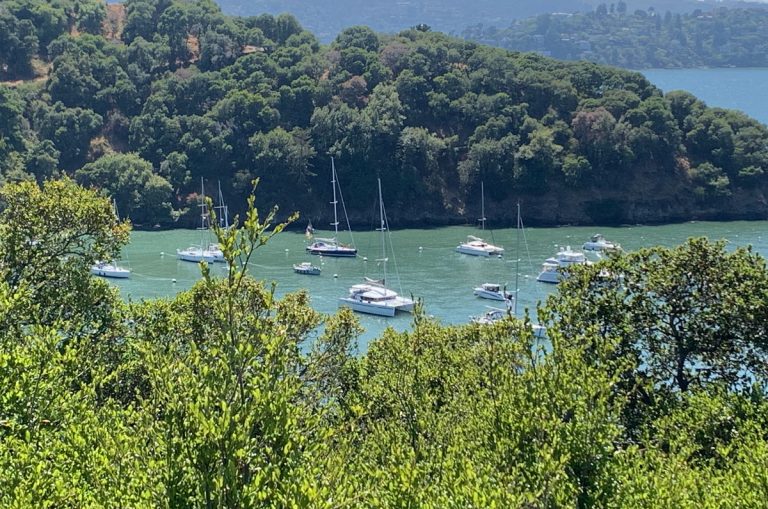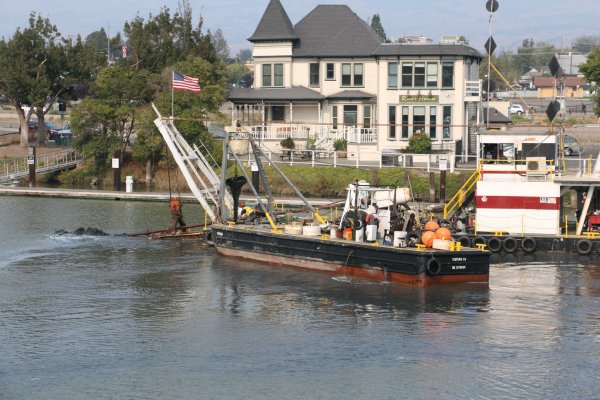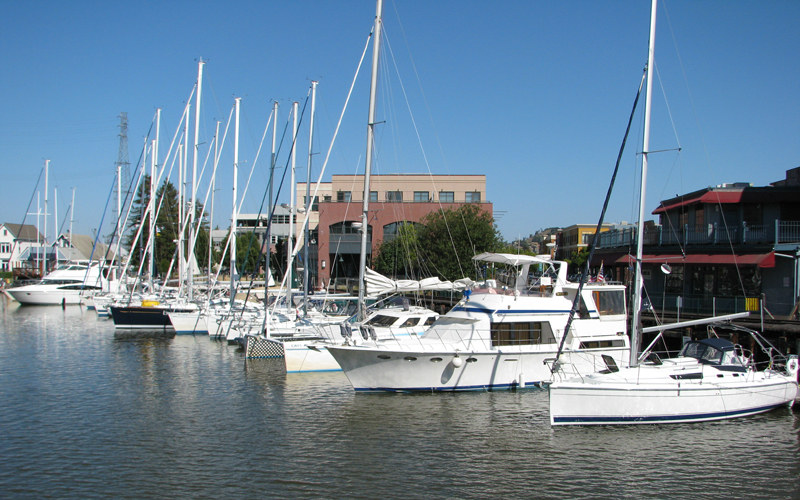
Speak Up To Allocate Available Federal Dredging Funds
Tired of running aground in Ayala Cove? Clipper Cove? Or trying to access the Bay from your marina? Ever since we’ve owned a boat with a 6.5-ft draft vs. a 5-ft draft the Bay has appeared much shallower. Why can’t all these shallow spots be dredged?
Though there are all kinds of impediments to removing the sediments, if you know where dredging is needed, you can help. Jim Haussener of the California Marine Affairs and Navigation Conference (CMANC) ran an ad in our current issue to let everyone know to speak up for dredging projects before the August 29 deadline.

The Bay Area’s federal waterways have been critical to both the commercial maritime industry and the recreational boating activities that make living in the Bay Area so rewarding. Cruising the Bay and Delta is a fantastic way to explore the region, but only possible if channels are kept open. Racing is tons of fun too, and much easier when you can get your deep-draft racer out of its slip and onto the Bay.

One of our favorite local destinations, the Petaluma River, was recently dredged and is now open for visiting sailors. This summer the San Rafael Canal is scheduled for dredging, which will be a huge benefit for yacht clubs and marinas along the canal and will open up the possibility of more cruisers accessing the marinas and services up to the San Rafael Yacht Club (established in 1896) right at the very head of the canal.

The tall ship Matthew Turner and many others are able to sail out of Sausalito because the Sausalito channel is kept deep enough for everyone’s passage. Congressman Jared Huffman has been instrumental in securing funds for these Bay Area dredging projects, and your local congressman can help do the same. Congressman Huffman is also a co-sponsor of H.R.3160, the Keep America’s Waterfronts Working Act, which is helping preserve the services and jobs that serve the local maritime community.

Beyond airports and trains, US waterways are a critical component of our overall infrastructure. They’re what allow trade and, for all of us, the opportunity to both work and play on the country’s most beautiful bays. Additionally, the National Marine Manufacturers Association (NMMA) states that the recreational boating impact in California is $13 billion. It supports 41,125 jobs and 2,820 businesses, with annual retail sales of new boats, engines, and marine accessories of $819 million.
For yacht clubs, marinas and others wanting to see federal funds allocated locally to keep the Bay accessible for Bay Area sailing, you can click on these links to learn more and make your case to your local congressperson. There is an August 29 deadline for submitting dredging requests. If you want to dig deep and help keep Bay Area boating accessible, you can learn more at these links:
Federal marina dredging law: https://www.congress.gov/bill/116th-congress/house-bill/133
Local dredging surveys: https://www.spn.usace.army.mil/Missions/Surveys-Studies-Strategy/Hydro-Survey/
Nominating dredging projects: https://www.usace.army.mil/Missions/Civil-Works/Project-Planning/WRRDA-7001-Proposals/
Contact your congressperson: https://www.house.gov/representatives/find-your-representative
We want to thank Jim Haussener and the local dredging companies for their support of recreational boating and for bringing this to our attention.
We were again reminded of why we want to do this when Glenn Isaacson closed his recent podcast with Moe Roddy saying, “Get out on the water, be safe and really take in the splendor that we have right here at our doorstep… we’re blessed, we really are truly blessed.”

It’s great that the Petaluma river was dredged. Unfortunately the US Corp. of Engineers made it clear to Petaluma residents that this would be the last time there would be dredging as there was no commercial traffic on the river at this time.
I opened all the surveys and didn’t see on for Ayala Cove. Are we supposed to ask for that?
As an environmentalist first and a sailor second, I strongly oppose dredging. Dredging harms the sea floor and al the life there, and stirs up toxic chemicals that should remain buried. I realize the logistics of having water deep enough for the drafts of boats, but let’s be honest: this is just recreation, despite how much we love it and consider it a large part of who we are. Are we really willing to do that harm and killing just to have some fun?
Jeff – As the company Patagonia acknowledges, just about everything we do in modern life pollutes, including the vehicles we drive, the clothes we wear, the dwellings we build and live in, and even the food we produce and eat. The challenge always is to strike a balance between reducing/mitigating pollution and environmental harm versus having a life well lived. Boating is one of the most beneficial pastimes both individuals and groups can participate in, and sailing vessels pollute less than power boats and motorized vehicles. Just as we do not anywhere have perfect safety, perfect environmentalism is not attainable in a modern world — we recognize and accept trade-offs all the time even while striving to do good.
George,
I’m aware of your point of view and fully understand it, because that view is the strongly predominant and majority one in this society hold. This is a human supremacist anthropocentric point of view, which means that you and the large majority of people think and feel that humans are better and more important than the Earth and all the life here, so you act like it. I’m an ecocentric deep ecologist, meaning that I don’t place humans above the Earth, the land, the sky, the water, the air, or any other life here, and that all of the life I listed has its own intrinsic value regardless of any value or lack thereof that it provides to humans.
The result of these greatly differing world views is that in yours, you perform the balancing that you described. In mine, you value the Earth and all life above human recreation and there is no balance to even consider. Plants and animals kill each other to eat, but other than that, we shouldn’t kill anything, and that includes harmful activities like dredging.
I also fully realize that we are many thousands of years from living naturally and refraining from destroying, harming, and killing others unnecessarily, and that it will take thousands of years to get back to living that way again. But I’m an old guard Earth First!er and I will always advocate for the Earth and all who live here over nonessential human activities.
I think we have to agree to disagree on this. Because the small minority of people who think like me live in your society, we understand your point of view. However, the vast majority doesn’t understand ours, which is far more akin to that of traditional indigenous people than of this society. I’m happy to continue this discussion if you so wish, but I don’t think there’s any basis for it considering that in some respects we live in very different, irreconcilable worlds.
Jeff — I don’t think it’s fair to say that people who sail or recreate outdoors think they’re “better and more important the Earth.” I would also challenge your implication that you are more of a steward of the environment, or love, respect and revere it more, or have dramatically less impact than the rest of us.
Respectfully, that sounds incredibly self-righteous.
To live a truly impact-free life would require severe abstention — a withdrawal from society, really (though you would still have some impact living off the grid). Do you drive, Jeff? Even electric cars are full of plastic, toxic materials and mined metals. Do you take public-transit? Trains and subways and buses require massive infrastructure flattening and piercing through nature and spewing smoke.
I would disagree that recreation is a “nonessential human activity.” No, you’re not gonna die if you don’t go sailing or hiking, but life without some kind of escape to nature sounds sterile and dreary and horrible. I would become depressed and generally unhealthy. “Indigenous people of this society” enjoyed themselves, recreated and played games — boating, fishing, trekking and hunting were part of culture and stories were told about people’s adventures. Other cultures would write novels and poetry and paint pictures of boats and sailing and adventuring. To me, art is one of humanity’s unique contributions to nature. (For better or worse.)
I really respect fighting the good fight, Jeff. Sometimes, I think humankind must be the dumbest species to ever exist if we can build skyscrapers and computers and airplanes and make art and music, but we can’t figure out how to live in harmony with the most perfect and already-in-balance ecosystem. It’s disgusting that the ocean is full of plastic, but yes, I still use plastic — I avoid single-use plastic, I have tote bags and a stainless-steel water bottle, I ‘only’ drive about 5,000 miles a year (which is less-than half of the average driver in the US), I eat about 70% vegan, I conserve and recycle water, I live in a house with solar panels, I pick up trash when I’m outside and on the water . . . but obviously, I still have an unsustainable impact on the planet.
But still, I would be willing to bet that on the “harm-scale” (or in an online “footprint calculator”), you and I — and most “environmental-conscious” people — would not score very far apart. I respect your point of view (and pretty much agree with your underlying philosophy), but are you really going to say that you’re living a much cleaner life than the rest of us?
Tim,
I didn’t say that people who sail or recreate outdoors are all anthropocentric human supremacists. I said that the large majority of people in this society are, and that advocacy of dredging is a perfect example of that attitude, especially when that dredging is for recreation. This issue is about dredging, not sailing.
We are also not talking about people’s lifestyles. No one in this environmentally destructive society lives anywhere close to ecological balance, and that’s not the issue. We’re discussing whether to advocate for or against dredging.
As to my personal lifestyle: yes I drive occasionally, but I gave up my car in 1999 and normally walk, bike, or take public transit. I have no kids, I eat almost no meat, and have solar panels on our roof. I’m far from being perfect, but I’ve made an effort. But again, this is a distraction; we’re talking about advocacy, not lifestyles.
Jeff — What is the environmental impact of dredging for recreation? What statistics and studies are you looking at? Each year, between 3-6 million cubic yards of sediments are dredged in commercial ports around the Bay. By all anecdotal accounts, marine life in the Bay has been flourishing. Dredging and a healthy ecosystem are not necessarily mutually exclusive, which I think is what you’re asserting. Of course there is an impact, but let’s get specific about what it is, and use some kind of objective calculus to consider the costs vs. benefits. (And again, recreation absolutely benefits humanity, and at its best, breeds lifelong environmental advocates.)
I’m not sure how you can say that you live a life more akin to indigenous people and that advocating for dredging reflects anthropocentric human supremacy, but that this somehow isn’t about lifestyle. The public transportation you use has had a far greater impact on nature than dredging. Are you saying it’s ok to use public transportation, as long as you’re not traveling to go have fun or enjoy yourself?
I listed the general harms of dredging (that I know of, there may be more that I’m unaware of ) in my original post on this thread. I’m not interested in overly intellectual statistics that are mostly used to justify anti-environmental behavior. If you prioritize the environment, the harms I listed that are caused by dredging are enough for you to oppose it. Industrial society is war against the Earth, and dredging is simply another harm allowed by industrial society.
I never said that I live a life akin to indigenous people. I said that my point of view was more akin to theirs than it is to that of this society. I have traditional indigenous friends, and our point of view about the natural environment and how people should interact or not with it is the same. I don’t recall ever disagreeing on anything, and I know for a fact that we’ve never disagreed about any general concepts regarding this.
Like John Arndt, our previous boat drew about 5 feet (4.75) and Ayala Cove at Angel Island was a joy to visit on a day sail or overnight on the moorings. Our current boat draws 6.5 feet (again, like John’s) and Ayala Cove is now impossible to visit. This is a wonderful public communication by Jim Haussener. I can certainly write a letter to Congressional representatives such as Jared Huffman requesting their support, but some of the information required in a proposal to the Corps of Engineers is difficult to come by for the average boater. Does anyone know if any such proposal has already been submitted for either Ayala Cove or Clipper Cove? It would be helpful to forward a PDF of any current proposal to Congressional representatives and governing agencies in any letters we might write to them. Thanks.
For all the dredging versus non-dredging out there – one word – hovercrafts!
;-p
Sail on..